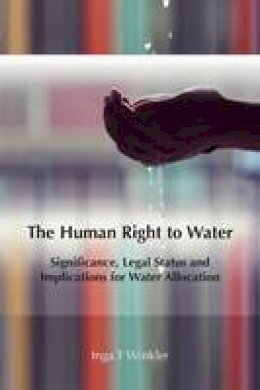
The Human Right to Water: Significance, Legal Status and Implications for Water Allocation
Inga Winkler
The United Nations General Assembly and the Human Rights Council recognised the human right to water in 2010. This formal recognition has put the issue high on the international agenda, but by itself leaves many questions unanswered. This book addresses this gap and clarifies the legal status and meaning of the right to water through a detailed analysis of its legal foundations, legal nature, normative content and corresponding State obligations.
The human right to water has wide-ranging implications for the distribution of water. Examining these implications requires putting the right to water into the broader context of different water uses and analysing the linkages and competition with other human rights that depend on water for their realisation. Water allocation is a highly political issue reflecting societal power relations, with current priorities often benefitting the well-off and powerful. Human rights, in contrast, require prioritising the most basic needs of all people. The human right to water has the potential to address these underlying structural causes of the lack of access to water rooted in inequalities and poverty by empowering people to hold the State accountable to live up to its human rights obligations.
Product Details
About Inga Winkler
Reviews for The Human Right to Water: Significance, Legal Status and Implications for Water Allocation
Sanghamitra Padhy
Law and Politics Book Review, Vol. 23 No. 12
The work is indispensable for Indian lawyers and judges who have to grapple with the issues arising from the right to water.
A.G.Noorani
Frontline
...she provides a strong account overall of the international human right to water, using detailed research and nuanced arguments to challenge the conventional conception of positive rights as aspirational and unenforceable. This work is highly recommended for anyone with an interest in the content and continued evolution of international human rights law.
Michelle Biddulph
Saskatchewan Law Review, Volume 76
With this book, Inga Winkler ... makes an important contribution to clarifying the meaning of this right and to informing the debate about it. It is the first legal monograph on the right to water released by an academic publisher and offers a solid and in-depth treatment of the subject matter. ...a timely and thorough monograph and a welcome and well balanced addition to the corpus of literature on the right to water, which is growing but nonetheless still short of in-depth studies of the nature Winkler has provided. The book is likely to become an essential standard reference for those interested in the right to water.
Kerstin Mechlem
Review of European Community and International Environmental Law, Volume 22(2)
...stands apart as an excellent introduction that provides a thorough and well-balanced legal study of the human right to water in international law. Winkler's publication also serves as a comprehensive overview offering enough background on related issues to assist further research. The work's form is as polished as its content, with the arguments clearly spelled out and summarised through an orderly and elaborate structure that is well complemented by an impressive bibliography and a detailed table of instruments and index.
Hugo Tremblay
McGill International Journal of Sustainable Development, Volume 8(2)
[A] useful contribution to the literature. A water lawyer looking for a thorough summary of human rights law as applicable to water, and which also understands the wider water context, will find this book a useful addition.
Sarah Hendry
The Journal of Water Law, Volume 22, Issue 6
... an impressive overview of the development of the right and substantial insights into its meaning and application. The Human Right to Water ... provides an authoritative analysis of the foundations, nature and implications arising from the recognition of the right to water. The book contains an impressive survey of the topic looking at both the legal nature of the right and the challenges of prioritisation. Importantly, Winkler concludes that the human right to water is legally binding therefore providing an important accountability mechanism and tool to improve water supply. ..an important contribution to the scholarship in this area and...essential reading for human rights scholars and practitioners.
Rebecca Bates
International Human Rights Law Review 1
